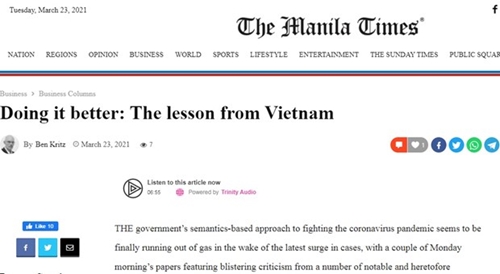Titled “Doing it better: The lesson Vietnam,” the article said 'Vietnam’s response to the coronavirus pandemic was based on its experience in handling the severe acute respiratory syndrome (SARS) pandemic back in 2003."
    |
 |
|
The article highlighting Vietnam’s effective anti-COVID-19 formula |
It was the second country after China to report the appearance of SARS —, as it were — and the first to be declared SARS-free by the World Health Organization (WHO), after only a few months.
“Vietnam’s pandemic playbook basically has four pages,” said the article.
First, as soon as it became apparent that there would be a need for them, the government provided substantial financial and administrative support for the development and production of home-grown medical treatments and supplies.
Research on a vaccine began as soon as enough sample material was available to start the work, and Vietnamese pharmaceutical concerns began work on no fewer than four different types of coronavirus test kits. These became available in export-quantity overabundance as early as April last year, and earlier this month, Vietnam began rolling out its own domestically produced vaccine, which according to available data is efficient.
Second, Vietnam employed a strategy of short, airtight lockdowns and restricted movement to prevent the spread of the coronavirus, acting at once to shut down entire areas that could possibly be affected by the appearance of a case.
The Vietnamese government spent generously on social support, even delivering food to people’s homes, the article said.
Third, realising that an effective tracing system is the most critical component of the pandemic response, Vietnam immediately developed and implemented a thorough, accurate and centralised contact tracing system.
Contacts for any person testing positive for the coronavirus are traced to three levels, and all of those people are tested immediately.
Finally, the article said, infected persons, regardless of their condition, are immediately quarantined for monitoring and treatment in government facilities, as are all of their first-level contacts.
While Vietnam is still restricting non-essential visits by foreigners, movement and economic activity in the country is for all intents and purposes normal. The Vietnamese government has even launched an aggressive marketing campaign to promote domestic tourism to boost the economy, according to the article.
Source: VNA